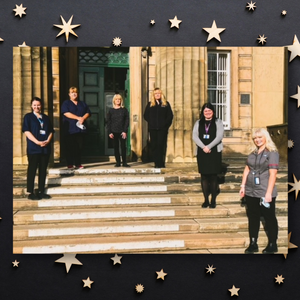
A specialist service supporting Cumbrian people experiencing delirium has won a prestigious national award in recognition of their positive impact on patient care.
The ‘Reach Out’ Delirium Team is part of Cumbria, Northumberland, Tyne and Wear NHS Foundation Trust (CNTW), the largest provider of mental health and disability services across the North of England. It was developed to identify and support patients with delirium in North Cumbrian hospitals, and prevent the condition wherever possible.
The team have won ‘Psychiatric Team of the Year: Older-age Adults’ at the Royal College of Psychiatrists Awards, which are held annually to recognise excellence within psychiatry.
Stuart Beatson, Group Medical Director for North Cumbria at CNTW said: “This prestigious award recognises the innovation and dedication displayed by the Delirium Team, and the significant improvement in patient care which has been achieved.
“They have gone above and beyond to prevent delirium and support patients, families and also staff within the hospitals. I’m extremely proud to see them recognised for that.”
Clare Bennett, the team’s clinical manager, added: “I am so pleased that the ‘Reach Out’ Delirium Team have won this award. I’m immensely proud of their hard work, attitude and commitment to delivering fantastic services to people experiencing delirium, especially throughout the pandemic.”
This upsetting condition affects about 2 in every 10 people admitted to hospital. Delirium is a temporary state of mental confusion that starts suddenly. It is actually caused by a physical condition of some sort, such as an infection – including COVID-19. Medical problems, surgery and medications can all cause delirium too.
Someone suffering from Delirium might not know where they are, what time it is, or what’s happening to them. In severe cases, the person may hear voices or see things that are not there, or believe that other people (such as hospital staff) are trying to harm them. Current research indicates that around three quarters of people remember their delirium, and all the distressing things that they experienced during it.
Delirium often leads to people staying in hospital longer than they might otherwise have needed to. This leads to worse health outcomes, and reduces the number of beds available – a particular concern during the COVID-19 pandemic and its pressures on the hospital system.
Read more about delirium, how to spot the signs, and how to support someone with it.
The ‘Reach Out’ Delirium Team was launched to help identify patients with delirium early on, so they can be successfully treated as quickly as possible and recover at home, as well as preventing delirium in the first place wherever possible.
Working seven days a week, the team proactively seek out and assess patients at risk of delirium who are admitted to hospital. They screen about 2,000 patients every month.
The team then ‘reach out’ to the patient, carers, and staff to offer support as needed. Patients with suspected or confirmed delirium are seen twice a day by the team. They also help to coordinate discharge and follow-up support for the person once they are out of hospital.
Delirium often leads to people staying in hospital longer than they might otherwise have needed to, leading to worse health outcomes, and reducing the number of beds available.
This service’s impact on preventing delirium and reducing patients’ length of stay has seen it save the local healthcare system over one million pounds each year. But most importantly, the service has increased the quality of care for people with delirium and their loved ones.
Since the team’s introduction in 2017 there has been a 20% reduction in delirium across North Cumbrian hospitals. The average length of stay in hospital for patients at risk of delirium has also decreased, and patient outcomes and quality of care have improved.
Throughout the pandemic, the team have also ensured that patients have maintained contact with loved ones – particularly important for people living with dementia, who struggled with isolation, low mood and distress during lockdowns.
Dr Adrian James, President of the Royal College of Psychiatrists, said: “I would like to express a huge congratulations to every team and individual shortlisted in this year’s RCPsych Awards. It’s been incredibly inspiring to hear about the great contributions to psychiatry being made by hard-working teams and individuals across the country.”
